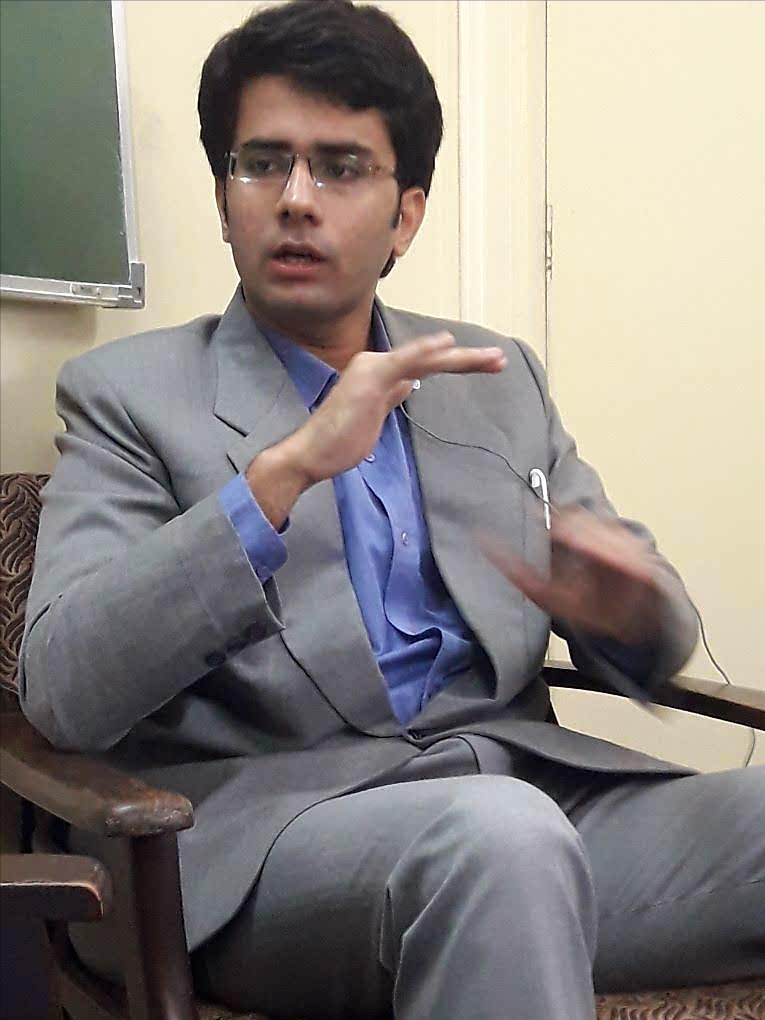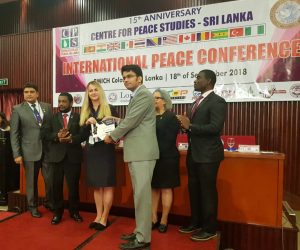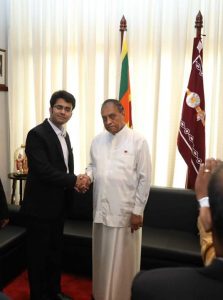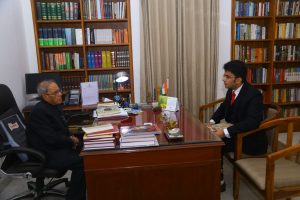Aditya Manubarwala is an Indian attorney and columnist on issues of law and public policy. He is serving as Law Clerk – Cum- Research Assistant at the Supreme Court of India (2018- 19) having been appointed by the Chief Justice of India and deputed to Hon. Mr. Justice Vineet Saran, Judge, Supreme Court of India.
He is also the incumbent Global Peace Ambassador to India (2018-19) appointed by the Centre for Peace Studies, Sri Lanka. He has previously served as Special Advisor on International Law & Affairs to Najibullah Azad, the then Spokesman to President of Afghanistan. He has also served as an Attaché to the Office of the Speaker of the Lok Sabha and is one of the youngest Indians to depose before a committee of Parliament in Indian Legislative History at the age of nineteen. In March 2018, the Kathmandu Tribune Nepal described Manubarwala as ‘Asia’s emerging youth leader. He is also the 2nd youngest Indian to have deposed before any Committee of Parliament in Indian Legislative History.
In August 2016, he was selected as an Indian Delegate at the Harvard Asia Conference, Hong Kong. Whilst at Hong Kong he also received the Chinese General Chambers of Commerce (CGCC) HPAIR Scholarship. The CGCC Scholarship is awarded to youth leaders across the globe who have shown commitment and enthusiasm towards empowering their country, community and Asia at large.
In the interview we speak about
- Experience of working at the Supreme Court
- His research on article 72 of the Indian Constitution
- His vision on the future of India’s engagement with the international law regime
- Experience as the youngest Global Peace Ambassador to India
Please share your experience of working at the Supreme Court of India as a Law clerk-cum- research assistant? Does this experience help you with your public policy reform work?
Working in the Supreme Court of India has been one of the most enriching experiences of my life. The multi-dimensional approach that one acquires while working on a wide array of matters across different fields and areas of law is rewarding in every way. Every year the Chief Justice of India appoints Law Clerks (who are generally fresh law graduates). These Law Clerks are selected from one of the most competitive exams in India conducted by the Supreme Court of India.
It’s been close to 6 months since I have been appointed as a Law Clerk – cum- Research Assistant and these 6 months have been a time of immense learning. One tends to appreciate the nuances of law as well as get acquainted with the inner workings of the Apex Court of our country in an unprecedented manner. I am close to completing the 500th matter in the court. Law clerks often provide significant research on ongoing cases up for final hearing. As a Law Clerk, amongst other things, I am expected to prepare a short briefing note which essentially summarizes the entire Special Leave Petition in 1 or a maximum of 2 pages. My ability to grasp, process and interpret vast, diverse and often complicated propositions of law has expanded significantly. One of the Judges of the Supreme Court of India once told me early in my tenure, that a lawyer, who can write well, is a lawyer who can speak well. I couldn’t agree more with this. As a law clerk, a vast amount of time is devoted towards reading paper books related to concerned cases which is ultimately processed and churned out into succinct notes; a logical corollary of this is improved writing skills and this in turn, significantly enhances verbal communication. A clerkship serves as a great prepping experience for a lawyer attempting to build his/her life in litigation, especially as an arguing counsel.
Of the many diverse cases that come up before the Supreme Court, the most interesting ones are the public interest litigation cases which question the Government of the day to account for omissions or commissions concerning implementation of the policy framed by it. While working on such cases, it is but natural that the genesis of the public policy has to be looked into as well the legal and practical creases and flaws in them. Working on such cases naturally helps get a more holistic picture of the workings of public policy and I feel blessed to have gotten this kind of exposure.
You recently did a detailed study on ‘Article 72 of the Constitution of India’ that highlights the overlapping of powers between the Governor and the President pertaining to the commutation of death penalty. Tell us a little more about the research. Why did you undertake this and why is this important? How do you intend to take this forward?
The seeds of this discussion were sowed in my mind while I was watching the news on a rather interesting day when the entire nation had their eyes glued on whether Yakub Menon would be sent to the gallows or not. While the news bulletin ticker showed President Pranab Mukherji having rejected the mercy petition of Menon, my eyes got fixated on a rather small ticker showing Yakub Menon now approaching the Governor of Maharashtra with his mercy petition. It got me curious to understand how Menon was even doing what he was doing. I perused the Constitution of India looking for answers and at the end of it, I was even more perplexed and disturbed than ever before. Article 72 (2) of the Constitution of India provides the President of India the power to commute a death sentence into life imprisonment (popularly called as the power to grant mercy). However, this power of the President is enjoyed by the Governor of the States, in the sense that the power of the Governor is equal to, and not inferior to the President of India in terms of commuting a death sentence down to life imprisonment. There exists no hierarchical division where the President is considered a superior authority to the Governor. This can perfectly emanate a situation wherein the President after rejecting the mercy petition of an anti-social element is overturned by the Governor of a State. Even if the Governor pocket vetoes the mercy petition (under advisement of the Central Government), the death sentence can be suspended on account of want of consideration, the moment the governor is approached. Interestingly, all these concerns were pointed out by Mr. Tajjamul Hussain, a member of the Constituent Assembly of India to Dr. B. R. Ambedkar during the drafting of the Indian Constitution.
My research on the aforesaid won the best essay prize at the 10th DD Basu Constitutional Law Essay Competition organized by NUJS Kolkata, whilst I was still a law student. Subsequently, I placed my findings on record before the Lok Sabha Speakers Research Initiative as well as discussed the same with Shri Pranab Mukherji, the Former President of India. My concerns have been patiently considered by senior political and legal functionaries but I believe that unless the highest offices of the country are sensitized about the massive constitutional crisis that this can bring about, there won’t be any tangible action. I have already sought an appointment with the President of India and I plan to petition the Prime Minister of India as well.
We understand that apart from public policy and law, you are also very active in the SAARC region and the international arena. Kindly share with our readers some notable experiences you have had. How did this journey begin and what’s your vision on the future of India’s engagement with the international law regime?
I represented India at the Harvard Asia Conference, Hong Kong, 2016. During the conference, I got acquainted with like-minded and socially driven individuals from 90 nations. After the conference, the interconnectedness of the global order dawned upon me and I started viewing domestic issues from an international perspective. Paying a closer emphasis to SAARC nations was the logical corollary for me. I am very passionate towards bettering the human rights regime in India and with my new found interest towards international relations, I started looking at SAARC as a holistic block. Drawing inspiration from the ECHR and other regional international human rights conventions, I along with my friend Shooha Tabil (a noted environmentalist from Bangladesh) drafted a draft SAARC convention on human rights. While lobbying for the enactment of this at the office of the President of Afghanistan, I came in touch with the Spokesman to the President, Mr. Najibullah Azad. Mr. Azad had previously read some of the articles I had published in Kabul Times and was thus well acquainted with my work. While the SAARC draft convention did not take off, due to instability in the SAARC grouping and Pakistan’s objections, Azad and I formed a deep bond. Subsequently, Azad appointed me as his Special Advisor and I prepared assets for Afghanistan’s National Water Policy Framework, with a special focus on leveraging Afghanistan’s Water Potential (I have also published an article in this regard in Modern Diplomacy Europe). Additionally, I worked on drafting a white paper towards reforming Afghanistan’s Courts and Administrative system.
Apart from Afghanistan, I also work closely with prominent civil society members of Bangladesh and Nepal on bringing to the fore issues of larger relevance before the international community.
In the international law arena, I see this to be a time of great opportunity as India is placed in the best position it has ever been in her 70 year history. India has always led from the front and shown immense respect to the international law regime right since her independence. However, with its rising stature as a global super power, India’s engagement with multi-lateral commercial dispute resolution bodies, the international arbitration regime apart from International Court of Justice, and other forums is only bound to rise. These are interesting times for young attorneys.
You were also recently appointed as the youngest Global Peace Ambassador to India by the Centre of Peace Studies in Srilanka (affiliated to the UN). How did that happen and tell us a little about your role as Global Peace Ambassador.
My increasing role in SAARC affairs led me to forging important relations in Sri Lanka. One such person is Mr. Shiraz Yoonus, who is a close aid of Mr. Mahinda Rajapaksa, the former President and former Prime Minister of Sri Lanka. I, in fact even served as Special Advisor to Mr. Yoonus on matters of International law and affairs for a brief period. Given my experience in the international law and public policy arena, including SAARC affairs and Sri Lankan affairs, the Centre for Peace Studies Sri Lanka (affiliated to the UN) decided to nominate me as their Global Peace Ambassador to India for 2018- 19. My role as Peace Ambassador has no defined terms, with me being given a wide landscape to operate on. Amongst other things, I have worked hard towards establishing a forum which serves as a connecting pod between the rising youth of India and Sri Lanka. I have also coordinated the international outreach efforts of Mr. Rajapaksa towards bridging the element of distrust existing between India and Sri Lanka on account of the Chinese influence in the region. My role has therefore been to ensure that the collective interests of India and Sri Lanka are not compromised by a resurgent China, which is trying its best in stifling the relevance of smaller countries with its economic bulldozer diplomacy.
I have also leveraged my position towards spreading awareness in India about the international law regime and the dispute resolution mechanisms available in the international arena.
What are your future plans? Is there any other significant research work that you have undertaken domestically or internationally in the area of public reform or towards bettering the global human rights regime?
I am currently working towards the enactment of the SAARC convention on human rights as well as the enactment of the SAARC Water Dispute Settlement Board.
The genesis behind my endeavor towards the SAARC Convention on Human Rights is the very fact that major international groups – be it the European Union or the Organization of American States, have a regional human rights convention setting basic standards of human rights enshrined and considered sacrosanct by them. However, an all encompassing human rights convention for SAARC is conspicuously absent. It must be understood that SAARC is a major international group of states, all of which are very closely connected by common history, cultural ethos, societal values and family values. For a better part of history, most of the countries in this group were governed by the same administrative systems. Having said this, it is but natural that the commonality of their value systems is synchronized into a holistic treaty.
To this end, the first step towards this project has been to create a group of likeminded individuals from SAARC nations who are busy imploring upon their governments to take this treaty forward. My team and I have made some significant headway in countries like Bangladesh, Sri Lanka, Nepal and Bhutan. However, the process is admittedly still a long way off . With regard to my work towards establishing a SAARC Water Dispute Resolution Board, the idea is still in a nascent stage. Currently, I am working and co-coordinating with a few international – trans-boundary water experts to arrive at a common ground on the principles which ought to govern this board. Once drafted, the next step would be to get Government support officially. This endeavor of mine is being supported informally by certain ministers from SAARC countries (who don’t wished to be named at this stage). However, work is still underway at a government-to- government level and I will be able to share more details once significant progress has been made.
I ultimately aim to be a litigating lawyer bringing to the fore often neglected issues of law, public policy and human rights while also maintaining a commercially lucrative practice. I hope to hold an elected public office in India someday in the future.
In the short run, I aim to pursue masters in law (LL.M) from a reputed institute abroad in the area of Constitutional Law and public policy.





















